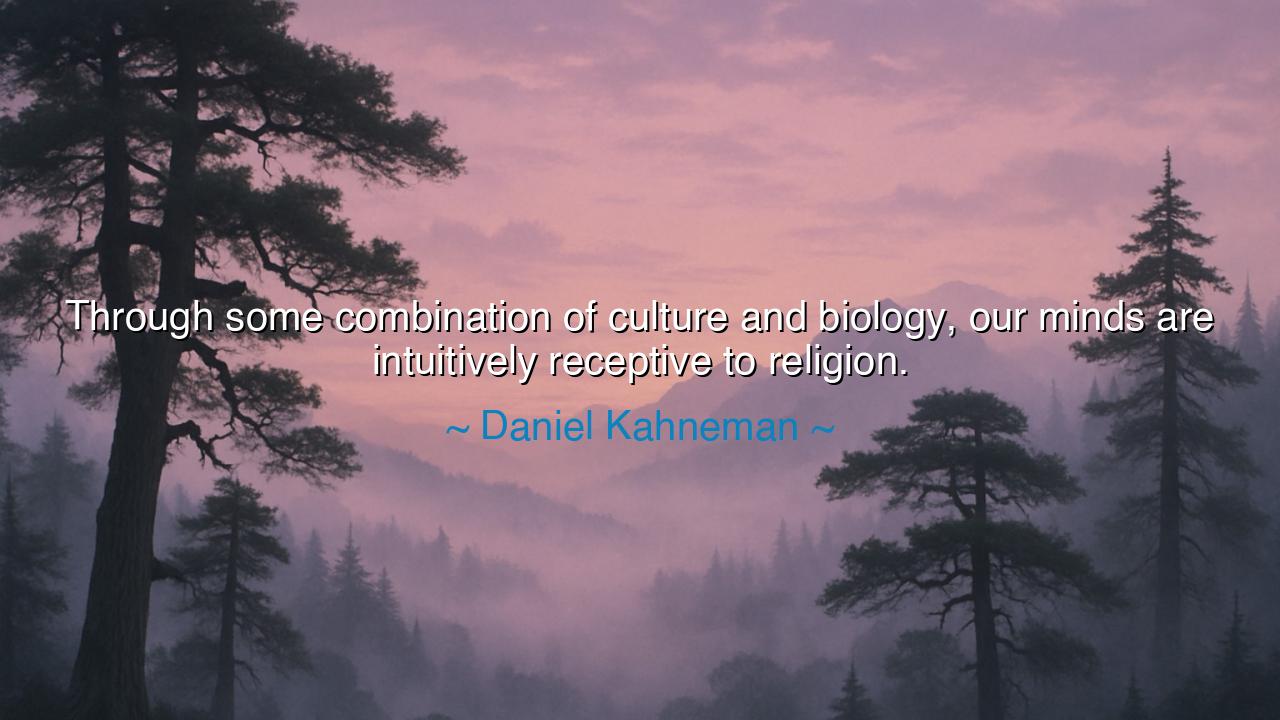
Through some combination of culture and biology, our minds are
Through some combination of culture and biology, our minds are intuitively receptive to religion.






Hear, O seekers of wisdom, the words of Daniel Kahneman, who declared: “Through some combination of culture and biology, our minds are intuitively receptive to religion.” In this saying lies a revelation about the human spirit, that faith is not merely an invention of priests or a relic of history, but something deeply woven into the very fabric of who we are. It is both the breath of tradition passed from ancestors and the whisper of instinct written in our blood. We are, by nature and nurture alike, drawn toward the sacred.
The origin of this truth springs from Kahneman’s work as a psychologist and thinker, one who studied how humans perceive, believe, and decide. His words acknowledge that religion has endured across millennia not by accident, but because it answers something within us. Biology inclines us toward seeking meaning, toward perceiving purpose where there is pattern, toward community and ritual. Culture refines these instincts into stories, doctrines, and traditions that bind people together. Thus, faith is not foreign to the human mind—it is its native language.
Consider the meaning of being “receptive to religion.” It is not only that people attend temples, mosques, or churches, but that within each soul there is a hunger for transcendence, a longing to belong to something greater than the self. A child gazes at the stars and wonders who made them; a warrior on the battlefield prays before the clash; a widow whispers to the departed. These gestures are not taught only by culture, nor driven only by survival—they arise from the mysterious union of mind and flesh that Kahneman names.
History confirms this. When the Spanish conquerors arrived in the Americas, they found peoples with no contact with Christendom, yet already rich with rituals, gods, and sacred myths. When explorers reached the islands of the Pacific, they found the same: prayers to the sea, offerings to the sky. From Egypt’s pyramids to India’s temples, from Greece’s Olympian altars to the Shinto shrines of Japan, religion had sprung up wherever man had set foot. Such universality testifies to Kahneman’s insight: across all times and cultures, faith finds fertile ground in the human soul.
But his words also carry weight for the modern age, when many dismiss faith as superstition or relic. Kahneman reminds us that to reject all religion is not merely to deny tradition, but to deny something deep within ourselves. For though cultures differ and beliefs clash, the intuition of the sacred remains. Even in secular lands, people gather around ideals as if they were altars—nations, human rights, progress—all imbued with almost religious fervor. If not in gods, the mind still bows before something greater.
The meaning, then, is both humbling and instructive. Faith, in some form, is inevitable, for it arises from both biology and culture. The wise, therefore, do not scorn this instinct, but seek to guide it toward compassion, justice, and truth. For when faith is nurtured well, it inspires service, courage, and hope. When it is corrupted, it breeds violence, arrogance, and tyranny. Our receptiveness to religion is both gift and danger; how we shape it determines whether it builds civilization or destroys it.
The lesson for us is clear: honor the sacred impulse within you. Do not suppress it with cynicism, nor allow it to be manipulated by false prophets. Seek traditions that uplift the human spirit and bind communities in love. Examine your own heart, for you too are shaped by the union of culture and biology, yearning for meaning. And above all, remember that this yearning unites you with all humanity, across lands and centuries.
Thus let the words of Daniel Kahneman endure: “Our minds are intuitively receptive to religion.” For in them lies the reminder that faith is not weakness, but an inheritance, both ancient and natural. Use it well, and it will be the root of wisdom and the pillar of peace. Use it poorly, and it will be the seed of ruin. The choice, as ever, belongs to us.






AAdministratorAdministrator
Welcome, honored guests. Please leave a comment, we will respond soon